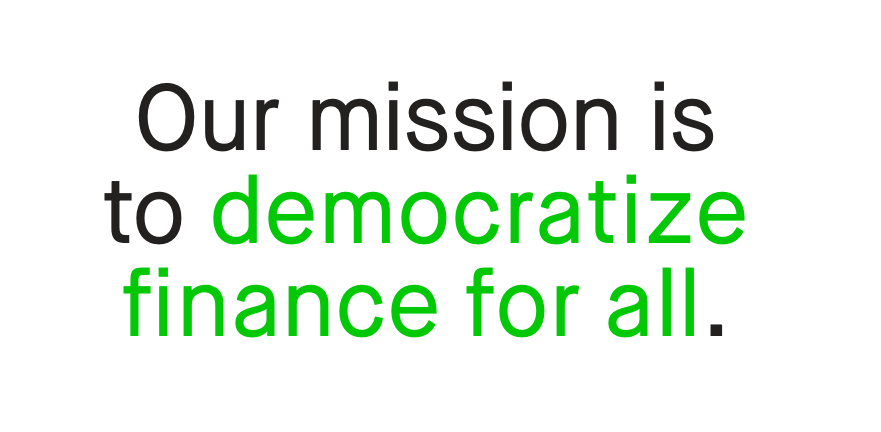The Menlo Park, California-based financial services firm Robinhood Markets, Inc. offers commission-free stock trading, exchange-traded funds and cryptocurrencies using a mobile app that was launched in March 2015. Moreover, Robinhood is a FINRA-regulated broker-dealer, registered with the U.S. Securities and Exchange Commission (SEC) and it is a member of the Securities Investor Protection Corporation.
- Robinhood makes money by collecting interests on the cash balances of customers, selling order information to high-frequency traders (a practice for which the SEC started an investigation into the company in September 2020) and margin lending
- It has 14 million monthly active users as of August 2022 (a decline of 1,9m accounts quarter on quarter) and 22.9 million funded accounts
- Assets under custody stand at $ 64B (a 31% decline quarter on quarter) and net deposits stand at $ 5.2B

EARLY DAYS
Back in 2014, the unreleased zero-fee stock trading service from Robinhood had 500,000 users signed up. The startup later raised $13 million to recruit additional technology talent to completely protect its software so it could begin adding users from its waitlist for the private beta. Back then, the goal for Robinhood was to create a digital-first and free app for a wider range of retail users.
- This allowed a much younger, less wealthy group of users to trade stocks who previously were discouraged since a $10 fee represented a sizeable portion of their whole investment
- In 2015, Robinhood’s average user age was 26.5 and 90% of its users were under 40
- Shortly after its initial launch, the company reported that it had already onboarded "hundreds of thousands" of customers who had transferred $ 1B through its platform and it had already saved $ 22m in trading commissions
Back then, the business plan was to charge other startups to build trading apps on top of its API. The company also aimed to charge a fee for allowing users to trade on margin. Additionally, Robinhood could collect money on its holdings if it could successfully win over customers' financial confidence.
FRACTIONAL SHARES & IPO ACCESS
Today, Robinhood's platform allows users to invest commission-free in U.S.-listed stocks and exchange traded funds (ETFs), as well as related options and American Depository Receipts through Robinhood's mobile app. Its main features are:
- Fractional share trading allows customers to invest in fractions of a share of stock, rather than requiring them to buy and sell whole shares. This service enables customers to build a diversified portfolio regardless of their budget and removes a barrier to investing in higher priced stocks, thereby providing access to a much greater selection of equities with as little as $1
- The recurring investment feature enables users to automatically buy shares of equities and certain ETFs on a set schedule, allowing them to build positions over time and establish regular investing habits, even with small contributions. Users can also elect to automatically reinvest dividend income back into the underlying shares
- The IPO Access feature enables customers to buy shares in participating initial public offerings (IPOs) at the IPO price, before trading begins on public exchanges
ADDITIONAL FEATURES (& CRYPTO)
Through the Robinhood Gold subscription, subscribers can access a number of premium features which include:
- Enhanced instant access to deposits enables subscribers to instantly access $5,000 to $50,000 upon making a deposit, depending on their portfolio value
- Professional research gives subscribers unlimited access to in-depth stock research reports on approximately 1,000 stocks through Morningstar
- Nasdaq Level II market data enables subscribers to see greater depth of orders for any given stock or option. The ability to see multiple buy and sell requests helps subscribers understand the availability or desire for a stock at a certain price
- Access to investing on margin is subject to approval upon meeting eligibility criteria set by Robinhood and enables subscribers to invest on margin at competitive interest rates
Robinhood also offers commission-free cryptocurrency trading in seven different cryptocurrencies: Bitcoin, Bitcoin Cash, Bitcoin SV, Dogecoin, Ethereum, Ethereum Classic and Litecoin. It also supports real-time market data for nine cryptocurrencies.
- During the third quarter of 2021, it opened a waitlist to subscribe for crypto wallet transfers which will enable users to transfer supported cryptocurrencies into and out of their Robinhood accounts
ADVANCED TRADING FOR RETAIL INVESTORS
Stock and ETF trading is immediately available following a fairly simple account onboarding process and funding. The company then reviews eligibility for users who wish to trade options, including disclosure of investment experience and knowledge, investment objectives and financial information.
- Subject to approval from Robinhood, customers can access basic options strategies, which permits buying calls and puts and selling covered calls and puts
- More advanced options strategies, which permits fixed risk spreads (such as credit spreads and iron condors) and other advanced trading strategies can also be unlocked after additional checks
Robinhood then conducts reviews of users' eligibility and takes action to revoke access, to ensure users are accessing the level of options strategies that are appropriate for them based on information such as their trading experience, investment objectives and financial situation.
"CUSTOMERS"?
But who are Robinhood's customers? Are these its 14m users as it likes to pretend? Here is one of their values, taken from their annual report:
"Radical Customer Focus. We exist to make our customers happy" Robinhood, annual report 2021
So, what generates sales for Robinhood?
"The bulk of its revenues came from payment for order flow, the controversial practice of selling customer trades to market makers that has been highlighted by the US Securities and Exchange Commission for review. In the three months to June 30, revenues from selling order flow fell 7 per cent to $202mn." by Madison Darbyshire for the Financial Times
And here is from the San Fransisco Chronicle:
"Whether Robinhood ushers in a “new Wall Street” or not, there’s no question that the old Wall Street has been too exclusive, expensive, opaque and complicated for too long. Much of that is intentional and by design to enable large, entrenched financial firms to extract wealth from the unwary. That status quo provided an opening for upstart firms like Robinhood to pitch Main Street investors, claiming that they were going to “democratize Wall Street” with easy access to stock market riches and less expensive, if not free, financial products and services.
But riches don’t come easy, and nothing is free on Wall Street.
Robinhood perfected slick marketing, predatory app features, hip logos and even used a legendary folk hero’s name to mask its self-enrichment scheme (in addition to outright illegal conduct that has been sanctioned by regulators repeatedly).
While no evidence has emerged suggesting anything illegal with regard to the buying halt, the incident revealed Robinhood’s real customers: powerful Wall Street firms that enriched themselves at the expense of retail traders by the “payment for order flow” (PFOF) compensation practice.
PFOF is when retail brokers like Robinhood sell their retail customers’ orders to the highest bidder. The revenue from PFOF is what enables Robinhood to then offer their retail customers what they call “commission-free trading.” But it’s not free. PFOF revenue are proceeds from the retail traders’ trades that otherwise would have gone to the retail traders.
In fact, a 2020 Securites and Exchange Commission enforcement action against Robinhood showed that the PFOF revenue extracted from the retail traders’ orders exceeded what retail traders would have paid if charged a commission and that Robinhood intentionally misrepresented that business practice to its customers.
Moreover, to maximize the revenue generated from the PFOF practice, trading apps (including Robinhood) use predatory “digital engagement practices” and other gamification techniques to get users to thoughtlessly trade more often and to trade riskier products." by Dennis M. Kelleher for the San Fransisco Chronicle

FOUNDER-LED MANAGEMENT
Robinhood was founded by Vlad Tenev and Baiju Bhatt. The company is currently led by Vlad and Bhatt serves as Chief Creative Officer. Gretchen Howard, a former CapitalG partner (Google's growth equity fund) acts as Chief Operating Officer.
- Vlad Tenev is a Co-Founder of Robinhood and, since November 2020, has served as Chief Executive Officer and President of Robinhood. Tenev is also Chair of the board of directors
- From 2013 to November 2020, Tenev served alongside Bhatt as co-CEO and co-President. Before Robinhood, Tenev started two finance companies in New York City
- Holds a B.S. in Mathematics from Stanford University and an M.S. in Mathematics from UCLA
- Baiju Bhatt is Chief Creative Officer and Co-Founder of Robinhood Markets
- Before Robinhood, Baiju started two finance companies in New York City with Vlad Tenev
- Holds a B.S. in Physics and an M.S. in Mathematics from Stanford University
- Chief Operating Officer of Robinhood Markets
- Prior to joining Robinhood, Gretchen was a Partner with CapitalG, Alphabet’s Growth Equity fund. While at Google, Gretchen was the co-site lead of the Google San Francisco office and a Managing Director in Sales & Business Operations, where she helped incubate, launch and scale Google's advertising offerings for SMB and large advertisers. Prior to joining Google, Gretchen was VP of Market Development and Field Sales for Fidelity Investments
- Gretchen holds an M.B.A. from Harvard Business School and a B.A. from Williams College
TAKE A BREATH
So… This is a lot of information. Let’s summarise:
- The Menlo Park, California-based financial services firm Robinhood Markets, Inc. offers commission-free stock trading, exchange-traded funds and cryptocurrencies using a mobile app that was launched in March 2015
- The company's free trading model quickly attracted the attention of younger investors. In 2015, Robinhood’s average user age was 26.5 and 90% of its users were under 40
- However, Robinhood's true business model has come to light in recent months as it mainly makes money by selling investors' data to large hedge funds
FINANCIAL CHECK
Total net revenues increased 6% sequentially to $318 million while transaction-based revenues decreased 7% to $202 million. Options revenue decreased 11% to $113 million but cryptocurrencies increased 7% to $58 million.
- Net loss was $295 million, or $0.34 per diluted share, compared with net loss of $392 million, or $0.45 per diluted share in the first quarter of 2022
- Operating expenses decreased 12% sequentially to $610 million.
- Net Cumulative Funded Accounts were 22.9 million, an increase of 100,000 sequentially
- Monthly Active Users (MAU) decreased 1.9 million sequentially to 14.0 million for June 2022
- Assets Under Custody (AUC) decreased 31% sequentially to $64.2 billion
- Net Deposits were $5.2 billion, which translates to an annualized growth rate of 22% relative to prior period AUC
- Average Revenues Per User (ARPU) increased to $56 from $53 in the first quarter of 2022
- Cash and cash equivalents totaled $6.0 billion at June 30, 2022, compared with $6.2 billion in March 2022
THE BOTTOM LINE
The Good
- Demand for cheap investing solution is growing as a large number of new investors flock to markets
- Robinhood has quickly grown to become the trading app for youth and has found ways to monetise its audience despite its free offering
The Bad
- The company had its fair share of bad publicity and is loosing users at a fast pace, this questions its ability to gain the trust of its users in order to become their preferred banking partner
Disclaimer
Please note that this article does not constitute investment advice in any form. This article is not a research report and is not intended to serve as the basis for any investment decision. All investments involve risk and the past performance of a security or financial product does not guarantee future returns. Investors have to conduct their own research before conducting any transaction. There is always the risk of losing parts or all of your money when you invest in securities or other financial products.
Credits
Photo by Robinhood.






